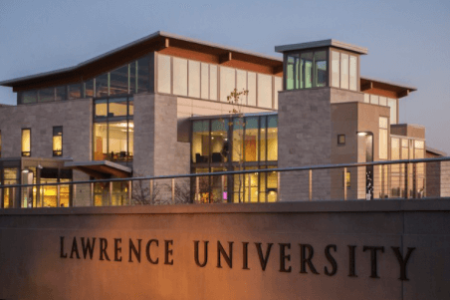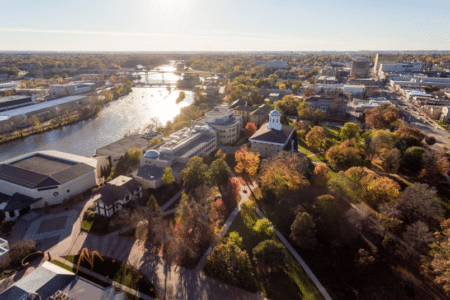Jo Dang left Vietnam and found her academic home at Appleton, Wisconsin’s Lawrence University. She had chosen the college for a compelling fusion of factors. “The strong emphasis on a close-knit community, personalised learning, and the liberal arts approach to education resonated with me,” she says. When she saw that the university is committed to diversity and inclusivity, that further solidified her decision.
Dang opted for a double major in Computer Science and Mathematics with a minor in Data Science. “Lawrence’s program stood out for its interdisciplinary approach, allowing me to explore the intersections of these fields,” she says. “My interest in computer science sparked in fourth grade when I delved into coding while playing computer games, and Lawrence’s comprehensive curriculum and faculty expertise were crucial in nurturing that passion.”

Small class sizes at Lawrence University ensure a personal and intimate learning experience. Source: Lawrence University
Founded in 1847, Lawrence University is one of the first co-educational colleges in the country. Celebrating its 175th anniversary recently, the university’s undergraduate offerings in the liberal arts, sciences and music today draw scholars and artists from nearly every state and 40 countries. This diverse environment fosters exposure to many perspectives, activities, and inspiration, preparing students for fulfilling lives marked by accomplishment, responsible citizenship, lifelong learning, and personal growth.
Transformative and illuminating education and experiences
The university may be one of the state’s top liberal arts colleges, but its programmes extend far beyond the arts and the humanities. Here, students can choose from four degrees and explore over 65 majors, minors, and programmes that cater to various interests, from Biochemistry and Biology to Computer Science. In fact, a new Business and Entrepreneurship programme was introduced to equip students with the tools to navigate the world of commerce.
In Biochemistry, you’ll study living organisms through theory and hands-on labs. You’ll master advanced techniques, analyse complex processes, and solve intricate systems. It’s a popular major given its versatility. Research opportunities in genetics, microbiology, marine biology, and beyond can pave the path to further study and careers in various fields such as science, technology, health, and medicine.
Through Computer Science, you will master Java, C++, SQL, Python, R, and more as you follow a dynamic programming curriculum. Meanwhile, the new Business and Entrepreneurship programme prepares future innovators looking to bring social, global and environmental context to business leadership.
Whichever programme you choose, you’ll benefit from a close-knit community with an 8:1 student-faculty ratio. Professors know who you are and what you need. Discussions can be more in-depth discussions, while guidance is more attuned to your aspirations and never takes a one-size-fits-all approach.
“Unlike larger universities, I experience smaller class sizes here, enabling meaningful interactions with professors and peers,” Dang says. “The emphasis on critical thinking and problem-solving aligns with the liberal arts ethos, offering a well-rounded education.”
Tra Yen Vy Phan, a junior majoring in Biochemistry, agrees. “Conducting labs and lessons in tight-knit groups allows for more interactive learning, with students exchanging valuable insights,” Phan says.
Contrary to the belief that programmes in Science, Technology, Engineering and Mathematics at liberal arts colleges might be limited, Phan’s experience at Lawrence proved enriching and multifaceted. Summer research programmes, participation in symposiums within and beyond Lawrence’s walls, and specialised seminars tailored for STEM students all played a crucial role in shaping her academic experience.

Lawrence University graduates excel in prestigious careers, landing positions at leading organisations, including Google. Source: Lawrence University
Nguyen Phuong Anh Bui, another Biochemistry student, was at first concerned she wouldn’t be able to find suitable summer research opportunities at the university. However, these worries quickly dissolved upon discovering the college’s available programmes. “You can register for Independent Study to start your research or continue your summer research,” she says. “Lawrence also offers many opportunities for STEM students to learn more about their career choices or plans after graduation.”
Unlike institutions where research is “filtered down,” Lawrence students work directly with faculty members on projects ranging from summer-long endeavours to year-round explorations. This close collaboration allows students to shape their research, dive deeper into their passions, and gain invaluable guidance from experts in their chosen fields. The best part? Generous grant opportunities support students to pursue their academic ambitions without financial constraints.
Ask Phan and she’ll tell you support comes in all forms here.. “The university provides comprehensive assistance, including funding, for students seeking experiences away from campus,” she says. “The faculty actively supports students through the application process and planning for their future endeavours. As a pre-pharmacy student, I’ve benefited from the guidance of professors, not only in meeting prerequisites for pharmacy schools but also in gaining relevant experiences.”
The result? Graduates take their next steps, competent and confident of their futures. As many as 99% of students are employed, in graduate programmes like Harvard and Johns Hopkins, or pursuing fellowships and military service within six months of graduation. Alumni can be found at leading organisations like Mayo Clinic, Google, IBM, and Sigma-Aldrich.
As many majors qualify for the STEM Optional Practical Training extension, international students have the added option to apply to work in the US and gain valuable work experience in the US after graduation. Interested? Learn more about Lawrence University.
Follow Lawrence University on Facebook, X, Instagram, LinkedIn, and YouTube.












